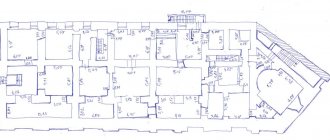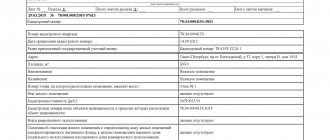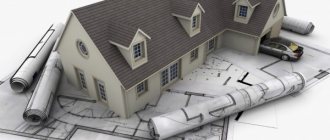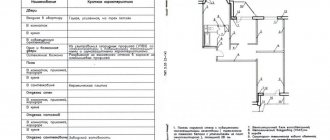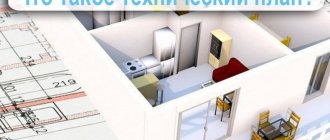To calculate the cost of utilities, you need to know the area of the common areas of the apartment building - stairs, attics, basements and other things (Article 36 of the Housing Code of the Russian Federation). The management organization takes this information from the technical passport of the house.
And he faces a problem. Most passports contain old incorrect data or were not filled out at all. In such cases, the value “zero” may appear opposite the area of the room.
We will tell you how the management organization can update the technical passport data. Is it enough to independently measure the area and draw up a survey report or is it necessary to involve a specialized organization and what document is used to make such changes.
We told you what is included in the technical documentation
Get a copy of the MKD technical passport
Before updating the information on the technical passport of an apartment building, you need to collect information about the availability of documentation for the house, conduct an inventory and obtain a copy of the technical passport of the house.
The first step you have to take is to obtain a copy of the MKD technical passport. To do this, contact the executive authorities of the constituent entity of the Russian Federation or the organization that has entered into an agreement with the executive authority of the constituent entity of the Russian Federation for the storage of technical passports, assessment and other documentation:
- registration books,
- registers,
- copies of title documents.
If these institutions could not help you, contact the Bureau of Technical Inventory. It is available in every city; the address can be found on the Internet or at the help desk.
In each branch of the Bureau of Technical Inventory you will find sample applications and a price list for the provision of services. Information boards with useful materials are hung in offices. Among such documents there should be a technical passport of the house.
You can request the information you need from the Technical Inventory Bureau. To do this, pay a fee for providing a copy.
The technical passport of the premises remains unchanged until someone makes a redevelopment of the premises, destroys structures, carries out reconstruction and other work that changes the data contained in the technical passport. Changes are easily detected during the initial examination.
To obtain a technical passport you will need the following documents:
- confirmation of ownership - any agreement on the transfer of property into your possession;
- statement or application;
- organization details.
Find out what documents need to be transferred to the new management organization
Restoration of converted housing
The worst verdict that an owner can receive is to return the apartment to its previous appearance.
This happens in cases where the redevelopment done violates existing standards and directly affects the entire structure. We are most often talking about load-bearing walls that were completely or partially dismantled during the renovation. It is often quite difficult to restore the previous appearance on your own . It should be understood that it is meant not just to somehow seal the opening, but to restore the integrity, giving the wall its former strength. Unauthorized work is sometimes extremely unsafe.
In such situations, a special project is first developed. Only accredited companies can prepare it. The document will cost a lot, and the restoration work itself will cost much more money than was spent on illegal redevelopment.
Important . If restoration is refused, the Housing Inspectorate may sue the tenant. Such violations can end extremely badly for him, ranging from large fines to eviction.
When carrying out redevelopment, it is important to promptly contact the BTI with a request to make some changes to your own apartment. The legal way of approval will take a lot of time, but will save money, and most importantly, nerves and time. You can perform the procedure yourself or transfer all the hassle to special companies that deal with these types of documentation.
Take inventory
To carry out an inventory, contact the Bureau of Technical Inventory, private organizations engaged in cadastral activities or cadastral engineers. And that's why.
Cadastral registration of a real estate property is carried out according to the rules of Federal Law dated July 24, 2007 N 221-FZ and Federal Law dated July 13, 2015 N 218-FZ. Cadastral work can be carried out by cadastral engineers and state technical accounting or technical inventory organizations that had the appropriate rights on December 31, 2012.
Technical accounting can only be carried out by specialized state and municipal technical inventory organizations:
- unitary enterprises,
- services,
- management,
- centers,
- the Bureau.
In addition to inventory, such organizations issue technical passports for MKD.
Until 2009, property owners had an obligation to conduct a scheduled inventory at least once every five years. But the RF PP dated April 30, 2009 N 388 abolished this norm.
Meanwhile, an inventory must be carried out to identify inconsistencies in the technical documentation of the MKD with the actual parameters. And here it is important to understand that the management organization is not authorized by the state to enter current information into the technical passports of MKD.
The management organization conducts an inventory of the common property of the apartment building as part of scheduled and unscheduled inspections of the house. If discrepancies are detected between the technical passport and the actual parameters, the management authority can contact specialized organizations to update the technical documentation and provide data to the authorized bodies.
What will happen to the MA if it does not transfer the technical documentation for the MKD to a new organization
Making changes to the Unified State Register of Real Estate after redevelopment of non-residential premises
Today, regarding the redevelopment of non-residential premises in non-residential buildings, there is an ambiguous position regarding the obligation/absence of obtaining the necessary permits for redevelopment. This is due to the fact that the current legislation does not contain the concepts of “redevelopment” and “reconstruction” of non-residential premises.
At the same time, according to the clarifications of the letter of the Ministry of Economic Development dated 03.03.2017 No. D23i-1179: According to paragraph 14 of Article 1 of the Urban Planning Code of the Russian Federation (hereinafter referred to as the RF Civil Code), the reconstruction of capital construction projects (with the exception of linear objects) is a change in parameters a capital construction project, its parts (height, number of floors, area, volume), including superstructure, reconstruction, expansion of a capital construction project, as well as replacement and (or) restoration of load-bearing building structures of a capital construction project, with the exception of replacement of individual elements of such structures for similar or other elements that improve the performance of such structures and (or) restoration of these elements.
In turn, the Housing Code of the Russian Federation regulates issues related to the reconstruction and redevelopment of residential premises (Chapter 4).
Thus, at present, at the level of federal legislation, the procedure for redevelopment of non-residential premises is not currently regulated.
The position of the Real Estate Department, taking into account the position of the Ministry of Construction of Russia (letter dated February 18, 2015 N 4302-NA/06) regarding redevelopment, including non-residential premises, is set out in the letter of the Ministry of Economic Development of Russia dated April 14, 2015 N D23i-1578 (posted on the website of the Ministry of Economic Development of Russia , as well as in information and reference systems on the Internet telecommunications network), in particular, issues of changing the boundaries of non-residential premises are resolved through the reconstruction of buildings and structures in which such premises are located.
In accordance with Part 11 of Article 24 of Law N 218-FZ, if the legislation of the Russian Federation in relation to real estate does not provide for the preparation and (or) issuance of permits and project documentation specified in Parts 8 - 10 of this article, the relevant information is indicated in technical terms on the basis declaration drawn up and certified by the owner of the property. The said declaration is attached to the technical plan and is an integral part of it.
Considering that in accordance with Decree of the Government of the Russian Federation of November 18, 2013 N 1038, the federal executive body exercising the functions of developing and implementing state policy and legal regulation in the field of construction is the Ministry of Construction and Housing and Communal Services of the Russian Federation , we believe it would be advisable to recommend that you contact the Ministry of Construction of Russia regarding questions of the procedure for redevelopment of non-residential premises.
At the same time, we consider it necessary to note that the need for local government bodies to issue certificates confirming the completion of the redevelopment of non-residential premises, as well as confirming that the completed redevelopment does not threaten the life and health of citizens and meets the requirements of sanitary standards and rules, or other similar documents is not provided for by the Civil Code of the Russian Federation , nor the Federal Law of October 6, 2003 N 131-FZ “On the general principles of organizing local self-government in the Russian Federation.”
Below are explanations of the letter, according to which obtaining permits from the compulsory medical insurance is not required.
“According to Part 10 of Art. 24 of the Federal Law of July 13, 2015 No. 218-FZ “On State Registration of Real Estate” information about the premises, with the exception of information about the area of the premises and its location within the floor of the building, or within the building, or within the relevant part of the building, is indicated in technical plan on the basis of the cadastral work permit submitted by the customer to put the building in which the premises are located into operation, design documentation of the building in which the premises are located, a redevelopment project and an acceptance committee act confirming the completion of the redevelopment.
As follows from the provisions of the Housing Code of the Russian Federation, the redevelopment project and the acceptance committee act confirming the completion of the redevelopment are included in the technical plan prepared for the residential premises.
These clarifications allow, if partitions were removed/added only inside the premises and did not affect the external walls of the premises, to prepare a technical plan based on an extract from the Unified State Register of Real Estate (since the area and location of the premises in the building is determined by the cadastral engineer independently and any documents on the building is not required if the characteristics of the building are not affected, as well as the design documentation of the premises, if available.
Another answer is also interesting: “Currently, at the level of federal legislation, the procedure for redevelopment of non-residential premises is not regulated. (Letter of the Ministry of Economic Development of Russia dated 03.03.2017 N D23i-1179) The position of the Real Estate Department of the Ministry of Economic Development of Russia, taking into account the position of the Ministry of Construction of Russia (letter dated February 18, 2015 N 4302-NA/06) regarding redevelopment, including non-residential premises, is set out in letter MED 14 April 2015 N D23i-1578 (posted on the website of the Ministry of Economic Development of Russia), in particular, issues of changing the boundaries of non-residential premises are resolved through the reconstruction of buildings and structures in which such premises are located.
In accordance with Part 11 of Art. 24 of Law No. 218-FZ, if the legislation of the Russian Federation in relation to ON does not provide for the preparation and (or) issuance of permits and project documentation, the relevant information is indicated in the TP on the basis of a declaration drawn up and certified by the owner of the property. The said declaration is attached to the technical plan and is an integral part of it.
Consequently, the Civil Code of Changes in non-residential premises in connection with a physical change in the parameters of their layout is carried out in accordance with the technical specifications prepared on the basis of documents on the reconstruction of the building (structure) or its part, i.e. input permissions. If there is no need to obtain permitting documentation, the TP of the premises, in addition to the “redevelopment” project and (or) technical report on the state of building structures after the completed “redevelopment,” includes a conclusion from an authorized body confirming the absence of the need to obtain permits.
At the same time, according to the position in the letters of the Ministry of Economic Development: the need to issue compulsory health insurance certificates confirming the completion of the redevelopment of non-residential premises, as well as confirming that the completed redevelopment does not threaten the life and health of citizens and meets the requirements of sanitary norms and rules, or other similar documents are not provided for by the Civil Code of the Russian Federation, nor Federal Law No. 131-FZ of October 6, 2003 “On the general principles of organizing local self-government in the Russian Federation.”
However, certificates (conclusions) confirming the absence of the need to obtain permits from the authorities authorized in the urban planning sector do not apply to the above cases due to the fact that it is the powers of the local self-government bodies (OGV, which are authorized to issue permits) to make a decision on the need (lack of necessity) issuing permits (the conclusion is confirmed by numerous judicial practices of the Department and the Branch).”
Get an updated technical passport
The Technical Inventory Bureau will help you obtain an updated technical passport for your home with updated information. To do this, send an application to the Bureau.
The Bureau develops the technical passport of the MKD in several stages:
- accepts and processes your application,
- enters the application into the schedule of visits of specialists for the initial examination,
- determines the departure date,
- carries out inventory,
- develops a technical plan of the premises and enters survey data into it,
- prepares a technical passport,
- gives you documents.
Find out whether it is necessary to provide technical documentation for the house to the owners upon their request
Check list
To update the data of the MKD technical passport:
- Conduct a scheduled or unscheduled inspection of your home.
- If you find discrepancies between the actual condition of the premises and the technical passport, apply for updating to the Technical Inventory Bureau.
- The bureau will process your application, conduct an inventory and prepare a new technical passport.
- Get an updated passport and continue managing your apartment building.
It is important to remember that: No, the management organization does not have the right to independently update the technical passport data. This should be done by specialized organizations. No, it is not enough to measure the area yourself and draw up a survey report. To update the information, you need to involve the Bureau of Technical Inventory.
Author of the article: Elena Shereshovets, director of SRO real estate managers “Quality. Innovation. Technologies", member of the Expert Council on Housing Policy and Housing and Communal Services of the State Duma of the Russian Federation, head of the department of "Legal Regulation of Construction and Housing and Communal Services" at the State Academy under the Ministry of Construction and Housing and Communal Services of the Russian Federation, employee of the Expert Group of the Center for Management of Housing and Communal Services for information and analytical support of reform and modernization of the housing and communal services industry in Russia at the RANEPA under the President of the Russian Federation.
